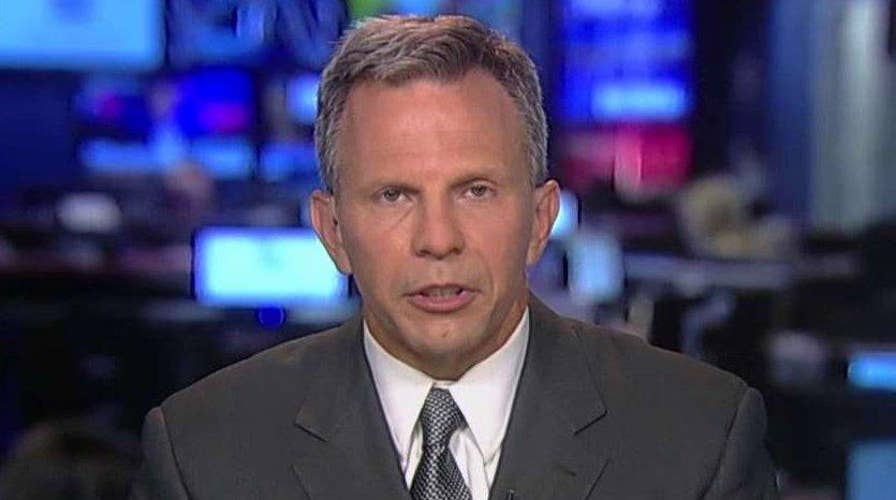Lt. Col. Tony Shaffer: Turkey helped create ISIS
New focus on U.S. strategy against terror group as Turkey begins major assault in Syria; insight on 'Your World'
After a pre-dawn barrage of heavy artillery and airstrikes, Turkish tanks and special forces pushed into Syria on Wednesday in a U.S.-backed assault aiming to retake a border town from Islamic State militants and contain Kurdish expansion. It marked the NATO member's most significant military involvement so far in the Syria conflict.
The U.S. military has backed the operation with eight airstrikes, a senior defense official told Fox News. A second U.S. defense official said airstrikes were "still ongoing."
The unprecedented incursion marked a dangerous escalation in the Syrian conflict -- and demonstrates the twisted rivalries that run through the war. The U.S. has long pushed for more aggressive action by Turkey against ISIS. But Turkey's move to thwart Kurdish ambitions puts it on a path toward potential confrontation with Kurdish fighters in Syria who are also supported by the United States and have been the most effective force battling ISIS in northern Syria.
U.S. Air Force A-10 attack aircraft from nearby Incirlik Air Base in Turkey took part in the strikes along with F-16s.
The Turkish military launched an operation with tanks and ground forces into ISIS-held Jarablus in northern Syria, not far from the border. There were an estimated 100-200 ISIS fighters in the city, one U.S. official said. Turkish officials claimed Wednesday afternoon the city was secured by Turkish-backed fighters.
"This is a crucial location because of [ISIS] foreign fighter flow," one official said.
Vice President Joe Biden arrived in Ankara hours after the operation began. Speaking from the Turkish capital, he said Kurdish forces "must move back across the Euphrates River. They cannot, will not, under any circumstance get American support if they do not keep that commitment."
There are "no U.S. boots on the ground in Jarablus," according to an official who added that the U.S. military had given intelligence information to Turkish counterparts. The official said U.S. warplanes destroyed ISIS fighters, fighting positions and mortar positions.
Moderate Syrian opposition fighters trained by the US military were also taking part in the ground operation in northern Syria, according to the senior defense official.
When asked if there was any concern the Turkish military would expand their operation in northern Syria to include Kurdish forces, the official said the U.S. support to the Turks was to strike ISIS only.
Turkey's President Recep Erdogan said the Turkish army would target ISIS and a U.S.-backed Kurdish militia in northern Syria known as the YPG, in a move that could further escalate tensions in the region. Erdogan called both the YPG and ISIS terrorist organizations in remarks Wednesday.
Turkey claims the YPG are affiliated with the PKK, a Kurdish militant group based in Turkey that has fought a decades long insurgency in Turkey killing tens of thousands of civilians. The State Dept considers the PKK a terrorist organization.
The YPG is seen as a key U.S. ally on the ground against ISIS in Syria.
U.S.-backed Syrian Democratic Forces, which includes the YPG, routed ISIS fighters from Manbij, located 24 miles south of Jarablus in the past few weeks.
A senior official with the YPG's political arm warned Turkey will pay the price. Saleh Muslim, the co-president of the Democratic Union Party or PYD, tweeted that "Turkey is in Syrian Quagmire. Will be defeated as Daesh" will be. He used the Arabic language acronym for IS.
Turkish Foreign Minister Mevlut Cavusoglu accused the Kurds have a secret agenda to establish a state. "If his (Muslim) intention had been to fight Daesh then he wouldn't oppose such an operation... And so the PYD's secret agenda is out in the open."
ISIS-held Jarablus is a key lynchpin in the Turkish-Kurdish rivalry. The town lies on the western bank of the Euphrates River at the point where it crosses from Turkey into Syria.
The YPG and other Syrian Kurds stand on the east bank of the river, and from there they hold the entire border with Turkey all the way to Iraq. They also hold parts of the border further west, so if they ever took control of Jarablus, they would control almost the entire stretch.
Last month, Kurdish forces and their allies scored a major victory, crossing west of the Euphrates to retake the town on Manbij from Islamic State militants. They now say they will push further west to assault the ISIS-held town of al-Bab.
Turkey codenamed its cross-border assault "Euphrates Shield," suggesting the aim was to keep the YPG east of the Euphrates River.
Turkish Prime Minister Binali Yildirim said that in Biden's talks in Ankara, the two sides reached agreement that that the Syrian Kurdish forces "should never spread west of the Euphrates and not enter any kind of activity there."
Cavusoglu said Syrian Kurdish forces must cross back to the east side of the Euphrates as soon as possible. "Otherwise, and I say this clearly, we will do what is necessary."
The Syrian government denounced the Turkish military incursion and called for an immediate end to what it described as a "blatant violation" of Syrian sovereignty. It said Turkish tanks and armored vehicles crossed into Syria under the cover of U.S.-led airstrikes.
Turkey has backed rebels against Syrian President Bashar Assad throughout Syria's civil war. It has conducted small, brief special forces operations in the past.
But Wednesday's assault was its first major ground incursion.
Fox News' Lucas Tomlinson and The Associated Press contributed to this report.

